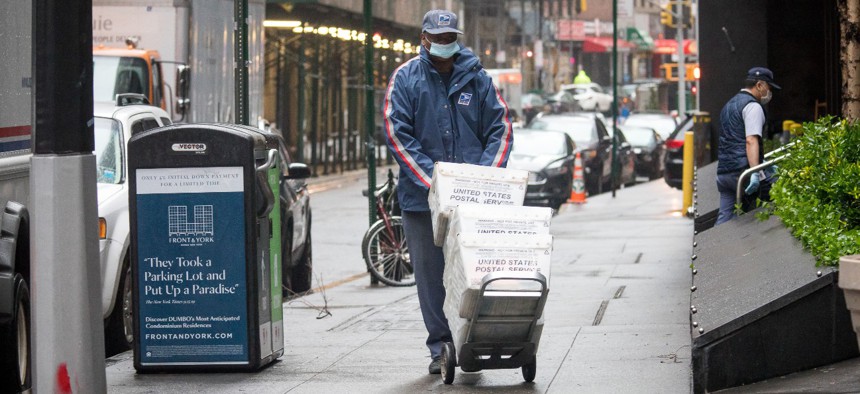
Michael Nagle/Xinhua via Getty Images
Postal Service Seeks Temporary Exemption From Biden's Vaccine-or-Test Mandate
USPS says it is looking to avoid a "dramatic loss of employees" during its busy season.
The U.S. Postal Service is seeking a delay in implementing the Biden administration’s mandate that employers with more than 100 workers require staff to either be vaccinated against COVID-19 or tested regularly for it, saying to do so now would disrupt the mail system and likely prove impossible.
USPS told the Occupational Safety and Health Administration it has inadequate staffing and resources to carry out the mandate and doing so would mean a loss of employees and further disrupt the nation’s supply chain during the mailing agency’s busiest time of the year. The Postal Service was not subject to President Biden’s vaccine mandate for the rest of the federal workforce, but as a large employer must comply with OSHA’s rule. Employers have until Jan. 10 to demonstrate they have taken steps to comply with the order, though the Supreme Court is hearing a challenge to the rule on Friday.
The Postal Service is seeking a 120-day extension to implement the rule, saying that would allow enough time to update its systems for record collection and bargain with its unions over the details. Postal management did not initially take steps to implement the rule, saying at the time of its announcement that it was unclear if it would apply to the agency. OSHA has since made clear USPS must comply, but the rule was quickly enjoined and blocked from implementation by a federal court. That injunction was lifted by another federal court, but its fate now rests with the Supreme Court.
“Given the significant challenges that our nation’s supply chains are already experiencing, we respectfully suggest that the nation cannot afford the additional potential substantial harm that would be engendered if the ability of the Postal Service to deliver mail and packages is significantly negatively impacted,” USPS wrote in its request to OSHA.
Postal management noted it is subject to Privacy Act and Freedom of Information Act laws that do not apply to large, private sector employers, and it therefore faces a larger burden to adapt its systems to collect and store employee records. Collecting records for its 650,000 employees is a “prodigious undertaking,” USPS said, and it may require the agency to purchase additional “technological infrastructure.”
The agency must negotiate the implementation details of the rule with its unions, the Postal Service said, and expects it can complete that during the 120-day pause. In the meantime, USPS does not want to divert attention away from its front-line supervisors who are still in the midst of the agency’s peak season. The vaccine-or-test mandate is likely to result in the loss of “many employees,” USPS said, and the current moment presents problematic timing. If the Supreme Court upholds the rule, the Postal Service said it will accept the impacts of the rule and adjust to it accordingly.
“By virtue of being a massive, unique, and complex agency, it can be very difficult and time consuming to make even modest changes to policies and procedures that impact the working conditions of ... employees,” USPS said. “This is especially true when the collection and use of medical information is involved.”
It added it is seeking to avoid disruption of its operations, given that it does not currently have sufficient resources for implementation.
“While the impact to our service could be devastating at any time of year,” USPS said, “requiring the Postal Service to absorb what could inevitably be a dramatic loss of employees at a time when the labor market is extremely tight and in the middle of the Postal Service’s peak season would have a potentially catastrophic impact on our ability to provide service to the American public when demand is at its highest.”
A Labor Department spokesperson said it was reviewing the Postal Service's request per OSHA rules, but defended the policy and noted the agency provided several tools to help organizations come in compliance with it in a timely manner. A shortage of personnel, materials or equipment are generally acceptable reasons to delay implementation of OSHA rules, however, the spokesperson explained.
“OSHA’s mission is to ensure every working person in the country has safe and healthy working conditions," said the spokesperson, who declined to be identified. "In keeping with that mission, our goal is to help make sure every employer complies with this standard to mitigate the spread of the coronavirus on the job and keep their workers safe."
Darlene Casey, a USPS spokeswoman, said the agency anticipates it will fully comply with the mandate after the 120-day period, if the rule survives in court. She stressed that in the meantime, the Postal Service would continue to use its existing plan to prevent the spread of COVID-19.
“The Postal Service is seeking temporary relief because it wants to ensure that its ability to deliver mail and packages is not hindered amid the current disruptions in the nation’s supply chain,” Casey said. “In addition, the Postal Service wants to adopt policies and procedures that comply with the [OSHA rule] while also fulfilling the organization’s other legal obligations.”
This story was updated with additional comment from the Postal Service and OSHA.
NEXT STORY: How to Avoid Achy Feet while Working at Home







